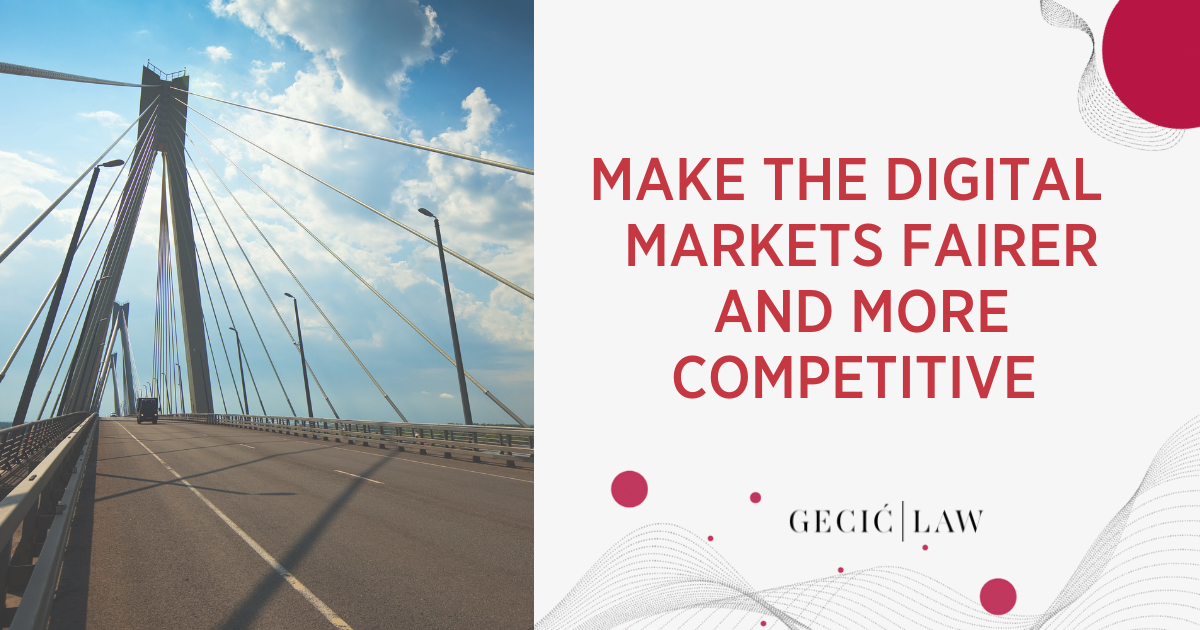

The EU Digital Markets Act (DMA) is meant to make digital markets fairer and more competitive. How DMA does this is simple: the European Commission designates the “gatekeepers” (mostly the big tech companies), imposing on them new obligations such as mandatory interoperability of gatekeeper’s services and preventing the gatekeeper from favoring its products and services against similar services or products offered by third parties on the gatekeeper’s platform.
A quick repeat of what it takes for a company to be a gatekeeper:
Based on these criteria, on September 6, 2023, the European Commission designated six gatekeepers. Unsurprisingly, these gatekeepers were Alphabet, Amazon, Apple, ByteDance, Meta, and Microsoft (Gatekeepers). The European Commission also set 22 core platform services (CPS) provided by the gatekeepers. These CPS are in different forms, such as operating systems, browsers, ad services, social networks, search engines, messaging services (N-IICS), etc.
Gatekeepers have six months to comply with the DMA obligations. Failure to comply with these obligations may result in fines of up to 10% of the gatekeeper’s total worldwide turnover or up to 20% in repeated infringement cases. In systematic infringements, additional remedies, such as obliging a gatekeeper to sell a business or parts of it or banning the gatekeeper from acquiring other services related to systemic non-compliance, may be imposed.
Although DMA is in its early days of application, some interesting reactions have happened on the market.
For instance, Gmail, Outlook.com, and Samsung Internet Browser were not deemed CPS by the European Commission despite meeting the thresholds. Gmail, for example, is probably the most popular email service. Still, it is based on open-source standards, enabling Gmail users to receive emails from other platforms and send emails to other email platforms. Hence, to reach Gmail users, a business does not have to enter the Gmail ecosystem but can freely access it from other platforms. This “openness” of Gmail helped it stay out of the gatekeeper regime.
We can already see how DMA affects how gatekeepers do business in Europe. Meta’s Threads and Microsoft’s Copilot are great examples of this since these platforms are not yet available in Europe due to DMA.
In one of its updates for Windows 11, Microsoft launched its AI assistant, Copilot. If you are in Europe, you have probably missed this. Why? Microsoft Copilot is available in North America, parts of Asia, and South America. So why not in Europe? The answer is DMA.
Microsoft explained, “We are working on an ambitious timeline to bring Copilot for Windows to the EEA in full compliance with the DMA, and we will continue to work with the European Commission as these compliance efforts progress.”
The DMA has influenced Microsoft to avoid launching the Copilot assistant in Europe. However, the good news is that Microsoft is working on adjusting Copilot to make it compliant with DMA.
Similarly, it is believed that Meta did not release Threads in Europe due to DMA. Meta launched Threads, a Twitter competitor, which gained over 100 million users in less than a week. However, none of these users were from Europe since Threads is unavailable in the app and Google Play stores in Europe. In an interview, Meta’s spokesperson said that this is due to “upcoming regulatory uncertainty,” presumably referring to the DMA.
The most recent news is that Apple intends to introduce RCS in 2024. RCS is a new standard to replace SMS and make it richer and more up-to-date with modern messaging needs. Google has long advocated for it (even putting public pressure on Apple to adopt it), in contrast to Apple, which showed hesitation. Now, probably due to DMA pressures to open up its gateway, CPS iMessage, Apple will cave in and allow Apple users to use RCS on its operating system. We will see how Apple will do this and if it will harm its iMessage.
Since the DMA affects how big tech companies profit from the user data they get for free, some of the tech companies are considering other monetization methods. Instagram, Facebook, and TikTok are considering charging a subscription fee for access to these platforms.
Meta discussed these plans with regulators in Brussels, according to which Meta would offer two versions of Instagram and Facebook. One of these versions would be paid and ad-free. The other would be a free version with ads targeting the users based on their personal information.
DMA has both positive and negative aspects. On the positive side, it fosters competition, improves market conditions, and safeguards user interests. However, on the potential downside, it could deprive users of certain services. It will be interesting to see how the DMA affects the development and availability of services worldwide.
Authors: Bojan Tutić, Nemanja Sladaković